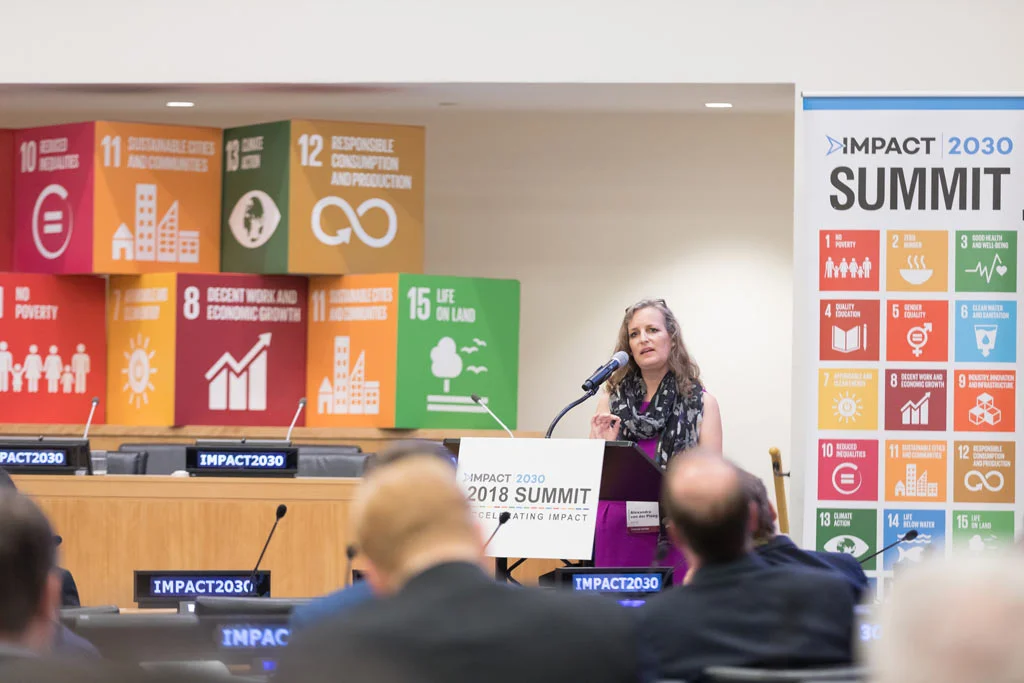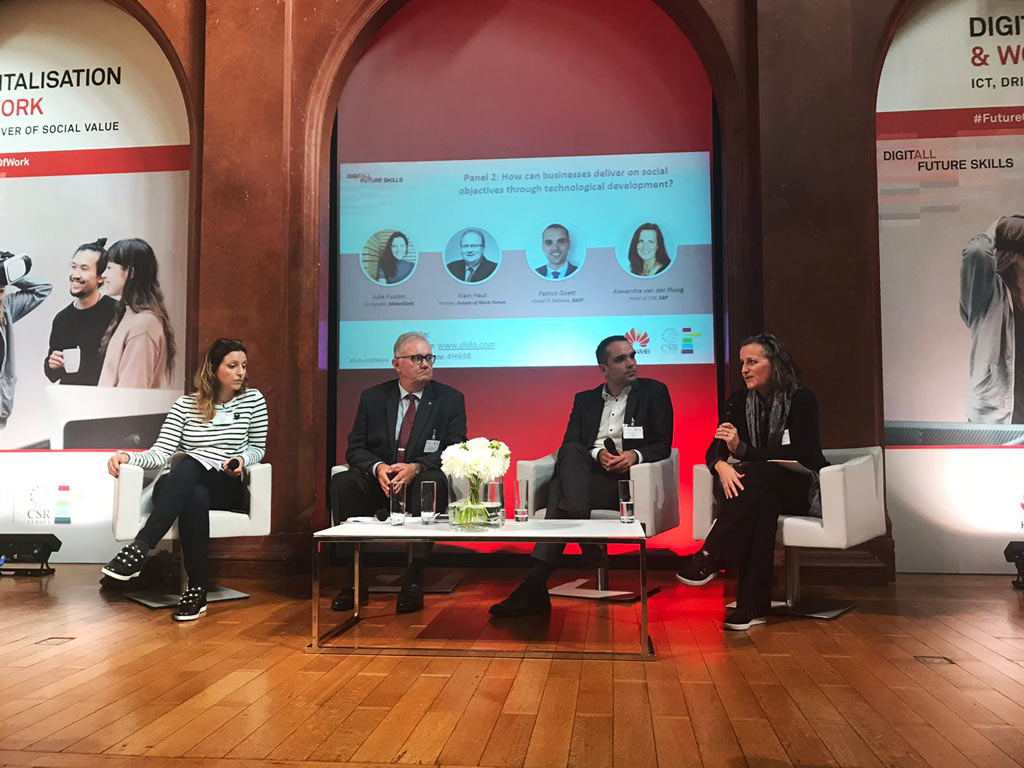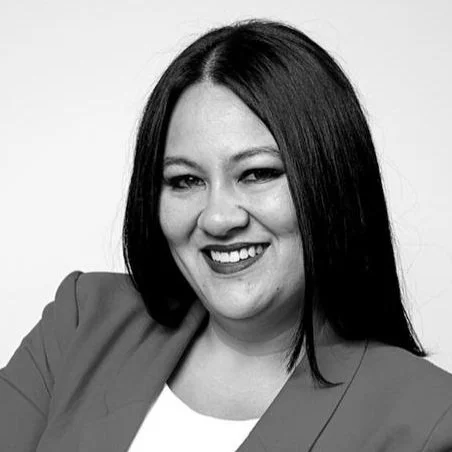Alexandra van der Ploeg On The Best Way To Make Corporate Social Responsibility Successful
Alexandra van der Ploeg is Head of Corporate Social Responsibility at SAP globally. Alexandra is responsible for setting the strategic direction of CSR focused on bringing to life SAP’s higher purpose of “helping the world run better and improving people’s lives” through strategic partnerships and programs that deliver sustainable social impact and long-term business value. In this function she also oversees corporate giving, volunteerism and the development of multi-stakeholder partnerships for which Alexandra has a particular passion.
Alexandra joined SAP in 1999. She started with SAP Switzerland in charge of management development and over the course of the next ten years held various managerial positions in Human Resources. Moving into the CSR organisation in 2010, Alexandra developed and managed various global CSR programs, such as building an infrastructure for social business in Haiti and the development of a range of pro-bono volunteering program, e.g. the SAP Social Sabbatical Portfolio. Alexandra also serves on the advisory council of IMPACT 2030 and is part of the Leadership Council of the Realized Worth Institute. She holds an MBA from Henley Business School in Great Britain.
Alexandra shares her experience in integrating corporate social responsibility into business strategy, rather than seeing it as a bolt-on, whilst providing insights into social enterprise around the world.
Highlights from the interview (listen to the podcast for full details)
[Tom Allen] - Could you please share a bit about your background and what led you to a career in Corporate Social Responsibility?
[Alexandra van der Ploeg] - It was a bit of a coincidence to be honest that I ended up in corporate social responsibility, as sometimes things happen in life. My career initially started in human resources. At SAP, I did about 10 years of human resources in the company, basically doing everything you can imagine under the sun when it comes to HR. In 2010, I moved into corporate social responsibility. The way that that actually happened is I moved with a volunteer project into CSR in 2010, just after the terrible earthquake in Haiti. Our then CEO met with Professor Muhammad Yunus at the World Economic Forum, and they decided that we were going to do a joint project between SAP and Mohammad Yunus to bring social business basically to Haiti to support long-term economic development in the country.
They needed volunteers from SAP. I put up my hand as an HR expert, which is one of the fields that they needed. I was doing that for three months, and then I realised that I just got very, very passionate about it. I basically convinced the company that we should stay involved, and I stayed on as project coach for another two and a half to almost three years to help set up a social business incubator in Haiti.
I’m sure that provided you with a lot of really interesting experience?
Absolutely. I think that still to this day, I say that that whole project laid a foundation for me in terms of what I believe in terms of the power of social entrepreneurship and social enterprise sector, but also it shaped the basis of how I believe volunteering, and particularly corporate volunteering can support economic development if done right. We probably also did a lot of things that did not really work, but to this day, I say it's baptism by fire. A lot of what I know was shaped through that time.
As Director of CSR of SAP then, what projects are you involved in day to day, and which of those do you believe have created some really strong positive social change?
I think when I moved into CSR in 2010, we were still very philanthropic in the way that we approached corporate social responsibility. As of 2010, we started shifting that into a much more strategic direction. One of the key things that we had to do to become more strategic were basically three things. One, we have to make sure we created focus, and we were starting to be much more aligned with the business. Bluntly speaking, prior to 2010, we were doing everything under the sun. We were writing a lot of checks to a lot of great causes obviously, but that had very little to do with us as a business and with our core competence and core assets.
That was the first thing that we did, is, what is it that we should be focusing on to ensure we're aligned with the business to be able to create social impact and value for society but also create impact and value for us as a business, to basically create that two-way street? Basically, we decided that with us being in the technology space, our biggest contribution could probably be made in ensuring that we prepare people for the digital economy, and we make sure that nobody gets left behind. Our slogan in CSR is to power opportunity for digital inclusion.
There's basically three things that we’re primarily focusing on. One, is we have a lot of digital skills programmes across the world in about 90 different countries. We look at bringing digital literacy to young kids, but it goes right up to providing employment opportunities to young adults in the IT sector.
The second pillar that we focus on, and that has a lot to do with our strong believe in multi-stakeholder partnerships, is we want to help non-profit organisations and social enterprises that are very innovative and are already creating a lot of social impact; we want them to be better at what they do. We want to help them be best run. That's our second pillar, and I'm sure we'll come back to that because that hits the social enterprise space.
The third one, is we look at how we can bring the vast expertise and know-how of our employee base of over 90,000 employees across 180 countries, how we can bring that connected to the programmes and initiatives that we drive so that we create sustainable social impact.
What a broad depth of work there. It’s really interesting work happening there at SAP, Alexandra. In some of my previous interviews, for example, with Roger Warnock, Mike Davis, Aline Laucke and Anika Horn and as well as other conversations, it seems that CSR can sometimes be perceived as a bolt on activity, which perhaps isn't effective as it could sometimes be to create that system change. I'm really interested in hearing about your perspective on some examples of the most effective and successful CSR strategies.
I think it goes back to what I was saying earlier that if you don’t want it to be a bolt on and add on to what you do as a business.
You need to make sure it's integrated into your business. I think the mistake that a lot of people make is that they see CSR as a function rather than as just being a part of the business.
Of course, the area that I'm responsible for is a function, but the way that we try to live corporate social responsibility goes way beyond our function. It looks at everything that we do within the company that is geared towards creating social good.
I think that's the first thing.
People need to stop thinking about CSR in purely functional terms and see it more as part of the DNA of the company. If you start seeing it as DNA of your company then it basically means you have to, as I said, connect it with the business strategy.
You have to figure out, what is it that makes you as a company tick, and what is it because of what you do, the products and services that you provide, what is it that you can do to tap into that to create societal good? I think that's one.
Your CSR activities have to be directly derived basically from the business strategy.
One of the key things that I've started noticing in the last years is you see the conversation shifting within the private sector when it comes to creating corporate social responsibility or making a contribution to society. I think it's basically two reasons why that is happening. One is Agenda 2030 and Sustainable Development Goals that were ratified in September 2015, and the increasing awareness and understanding that the private sector plays a significant role if we want to achieve any of the goals, any of these ambitious goals that the UN has set out for our planet.
The second one is that what we've seen is, particularly in conversations with our customers and partners, a lot of players in the private sector are increasingly what they call being purpose-led. Looking at not just creating economic value but creating societal and environmental impact at the same time. Basically look at the triple bottom line rather than just at the bottom line.
I think that drive towards being increasingly purpose-led is asking companies to integrate CSR much more strongly into the business rather than see it as an add-on.
Yeah, absolutely. How have you then seen the corporate sector shift in recent years and what are the typical challenges that you see corporate leaders coming up against, Alexandra?
As I said, we see increasingly companies being much more purpose-led. By the way, this is not just a… I’m Dutch, so I tend to be a little bit blunt. This is not just in my opinion at least. Sometimes you have trends that come and go, but I truly believe that the private sector looking towards finding higher purpose and applying that higher purpose towards the triple bottom line, is not a trend that will go away, and here's why…
There's things happening in the economy that point towards it being there to stay. I think, one, consumers are being much more demanding of their brands. What you see is people switching brands if they believe that a company is not doing its part and is not being positive in its contribution to society.
We have a whole generation, be it Millennials or Generation Z that demand of business to be purpose-led.
They will basically say, “Look, we will not buy from you, but we also don't want to work for you if you're not making a positive contribution towards the planet.”
I think because of those trends, its purpose is basically here to stay. If that's what you believe, then maybe let’s switch this conversation towards the social enterprise sector and why I believe that they play such a fundamental role.
Social enterprises, in my opinion, are absolutely pivotal in that, they are the role model for what it means to be purpose-led. It can serve as an inspiration to the private sector, but in turn, we, as the private sector, can also inspire them to be better at what they do.
Are there any particular countries then that you believe are really leading the charge when it comes to social enterprise and social innovation? If so, what are they doing that you think other countries could adopt?
I think there's different countries that become or are becoming lighthouses for different reasons. I'm going to mention one that might surprise you. One of the countries that stick out for me is India. Why I’m mentioning this is that a few years ago, India signed off the so-called India Companies Act. I don't know if you have heard about that, but India is one of the first countries, if not the first country in the world, where the government basically said, “We are going to determine by law how much companies are supposed to spend on corporate social responsibility and what they need to spend it for.”
Basically, the India Companies Act says to private sector companies that are established in India that they need to spend 2% of their profits into corporate social responsibility activities. Those activities need to be tied to the national agenda of a digital impact. Interesting enough, social entrepreneurship plays a significant role.
What we have seen in the last few years is a significant increase in social entrepreneurship in India. It is really booming, so quite interesting to observe that.
In other parts of the world, I think any country that has taken legislative action towards establishing social entrepreneurship as a valuable part of economic development is also what sticks out. Again, in the very beginning, I said around the Social Enterprise World Forum in Scotland how surprised I was about the booming social enterprise sector in Scotland, which I was not aware of whatsoever, despite having lived in Scotland for four years during my university time. That is only because the government, the Scottish government is so incredibly supportive in setting up and driving social entrepreneurship as a valuable part of economic development in the country.
It was certainly really inspiring to witness the recent Social Enterprise World Forum in Edinburgh, Alexandra. What inspiring projects or initiatives have you come across recently that you wish to share with our audience?
There are so many that it’s hard to point to the ones that… Maybe let me take some examples just from the Social Enterprise World Forum because there's so many organisations and social enterprises that we come in contact with on a daily basis. Each and every one of them I find incredibly inspiring because of the incredible work that they do.
One of the organisations that truly inspired me in Scotland was the Social Enterprise Academy. I think it was also because, to me, they had one of the most moving and emotional contributions on stage at the Social Enterprise World Forum when they brought school kids from two different schools on stage to talk about their social enterprise projects. The reason why I'm highlighting this is that I truly believe that it's the younger generations. They are our future anyway, but if you can inspire them already at a very young age to be entrepreneurial in their mindset, and at the same time, combine that with social responsibility, we are setting ourselves up for a pretty bright future.
The work that they do I find incredibly inspiring. They work with so many different schools, not just in Scotland, but in the countries where they have built up hubs to inspire young children to look at how they can use business thinking and business models to create societal good and to make an impact on causes that are important to them as children. I found that incredibly inspiring, and I hope that we will see much more from the Social Enterprise Academy in that space.
Similarly, you know that the next Social Enterprise World Forum is going to be hosted in Ethiopia next year.
Very much looking forward to it.
Yeah, me too. It's going to be a very different Social Enterprise World Forum, I'm sure. I found it very interesting to hear about the social enterprise endeavours that are already happening in Ethiopia today. There were two people in particular on stage. One, [Kibret Abebe], had set up social enterprise in the private ambulance space that I found pretty fascinating, particularly because he was talking a lot about his personal struggles, but it also showed the incredible commitment that he had to make sure that what he believed in was actually going to happen and take place, irrespective of the personal sacrifices that he had to make.
The other one was the Tibeb Girls, the TV show that has just been produced to show girls how they can be empowered and how they can basically take charge of their own life, be entrepreneurial and make something out of themselves, and particularly also look at how they can be part of the digital world and how that can empower them to be self-sufficient and be of value to society. It's going to be very interesting, I think, to hear many more examples like that when we are in Ethiopia next year.
Absolutely. I cannot wait for that forum. To finish off then, Alexandra, what books would you recommend to our listeners?
One of the key books that I read that inspired me, particularly around social entrepreneurship, was a book that was written by Jacqueline Novogratz. She is the founder of the Acumen Fund. She wrote a book called The Blue Sweater. In that, she describes basically her journey toward social entrepreneurship out of the financial sector, which is where she spent a large part of her career. I think it's very well written book. It's a very easy read, but it's very inspirational.
I'm a big fan of the work that the Acumen Fund does with patient capital and in supporting and funding high-impact social enterprises, particularly in Eastern Africa and India and Pakistan. I'm pretty sure we will see social enterprises that are supported by the Acumen Fund in Ethiopia next year as they have a pretty strong hold in Eastern Africa as I said. That's definitely a book that I would recommend to anyone.
Initiatives, resources and people mentioned on the podcast
The Blue Sweater by Jacqueline Novogratz








